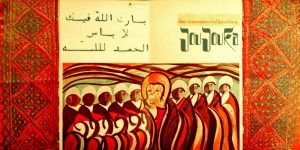I wrote a primer on Moroccan “trance” music for the March 2017 issue of The Wire. The piece is built around the recently issued Dust to Digital set of Paul Bowles’ 1960 recordings made in Morocco, and covers (briefly!) the history of 78 recordings in Morocco, other ethnographic recordings such as those made by Ocora and by Philip Schuyler for Lyrichord in the 1970s and 1980s, the folk revival led by groups like Nass El Ghiwane, Jil Jilala and Lemchaheb in the 1970s, the history of recordings made at Jajouka and of the Gnawa brotherhoods, the long history of collaborations between jazz musicians and Moroccan traditional musicians, from Randy Weston through Peter Brotzmann and Ornette Coleman, the amazing career of Hassan Hakmoun and the more recent metal/noise sounds of Abu Lahab. I meditate on “trance” as a word and phenomenon that spans both traditional and avant garde musics, secular and sacred sounds, and one that changes historically and geographically in meaning. Bowles himself preferred the word “hypnotic” because it sounded more secular. “Psychedelic” might work too.
The essay begins with this amazing quote from Bowles, from his essay “The Rif, To Music”:
“Few of them are as frank about their convictions as the official in Fez who told me: “I detest all folk music, and particularly ours here in Morocco. It sounds like the noises made by savages. Why should I help you to export a thing which we are trying to destroy? You are looking for tribal music. There are no more tribes. We have dissolved them. So the word means nothing. And there never was any tribal music anyway – only noise. Non, monsieur, I am not in accord with your project.” In reality, the present government’s policy is far less extreme than this man’s opinion. The music itself has not been much tampered with – only the lyrics, which are now indoctrinated with patriotic sentiments. Practically all large official celebrations are attended by groups of folk musicians from all over the country; their travel and living expenses are paid by the government, and they perform before large audiences. As a result the performing style is becoming slick, and the extended forms are disappearing in favour of truncated versions which are devoid of musical sense.”

Speak Your Mind